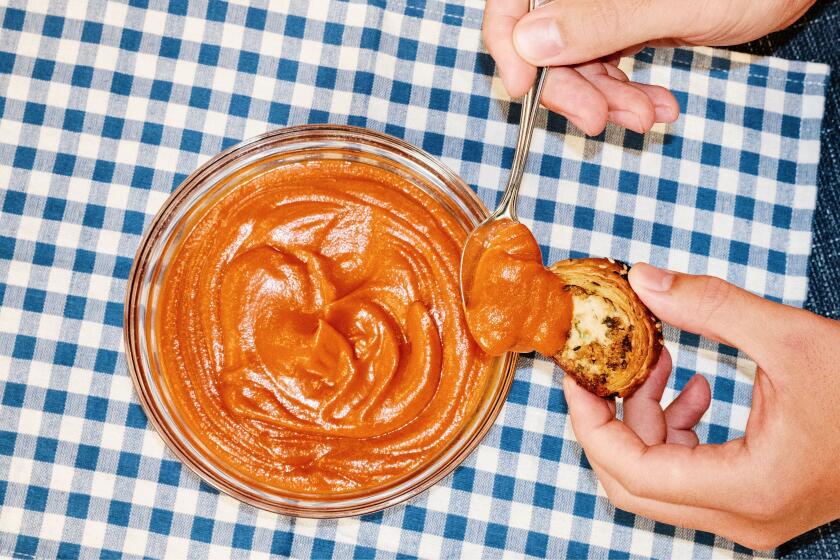Carl’s Jr. Jumps Out of the Fat, Into Light Oils
Carl’s Jr. is getting an oil change.
The fast-food chain announced this week that it is testing cholesterol-free french fries, zucchini and onion rings in its 30 San Diego restaurants. The outlets are cooking all of their fried products in a blend of corn and soybean oil, rather than an animal-vegetable blend, a saturated fat that generally is considered less healthy.
If enough customers sink their teeth into the lower-fat food, the Anaheim-based chain says it will switch to vegetable oil in all 490 of its stores.
The test program makes Carl Karcher Enterprises, operator of Carl’s Jr, the latest fast-food chain trying to capitalize on consumers’ supposed growing desire to eat their way to better health. Over the past year or so, just about every fast-food chain has at least tried offering low-fat, no-fat or cholesterol-free menu items.
Heightened consumer fears about how much fat is in food persuaded Blimpie--the chain known for its submarine sandwiches heaped with cold-cuts and mayonnaise--to announce this week that it will test salads and a low-cal version of its sandwiches in Georgia this summer.
Long John Silver, which has long sold deep-fried, battered fish, has added a broiled variety to stores in many locations. And within the past year or so, McDonald’s, Burger King, Taco Bell and Hardee’s all have switched to frying at least some of their menu items in vegetable shortenings.
“It’s a definite trend in the industry,” said Howard Hansen, a restaurant analyst with Kidder, Peabody & Co. in New York. With American demographics generally shifting toward older customers, fast-food chains “have to widen the menus and offer what could be perceived as healthier items,” Hansen said.
Change at the Colonel’s
The down-with-cholesterol movement has become as much an effort to keep up with the competition as to bring in new customers with new offerings.
The Colonel’s Kentucky Fried Chicken, for instance, this month will start testing char-broiled chicken in the Southwest to attract the calorie-conscious as well as to avoid losing market share to competitors such as El Pollo Loco or El Pollo Asada.
El Pollo Loco Corp. of La Mirada now claims 21.9% of the convenience restaurant chicken market in Los Angeles.
While the market for char-broiled chicken is comparatively small now, Kentucky Fried doesn’t want to get grilled by the competition. “Clearly, we wouldn’t want someone to come in and preempt the segment,” said Gregg Reynolds, spokesman for Kentucky Fried Chicken. “It would be stupid for us to be caught unaware.”
Being a late-comer to the crusade may have, in fact, cost Carl’s Jr. some sales. “It’s too early to tell. We really won’t know until the end of May when the test is finished and we see” if people prefer the less-fatty foods, said spokeswoman Patty Beckman. The hamburger chain was late to jump on the bandwagon because it needed time to make the switch for all of its fried products.
But if the lower-fat items catch on, the results can be dramatic.
Hardee’s, the nation’s third-largest fast-food burger chain, for example, has seen sales climb 25% since June, when it began frying its chicken, turnovers, fries and fish in a 100% vegetable blend of soybean and peanut oil. The company traces the gain to the switch from beef tallow, a saturated fat that raises cholesterol levels in blood.
But healthier products do not always guarantee fatter profits.
At Carl’s Jr., the cooking oil switch means tampering with a formula that its customers know. “People will be able to taste the natural flavor of the potato more now,” insists Beckman.
Perhaps. But McDonald’s and Burger King both say they have resisted using 100% vegetable shortening--which can cost 30% more than an animal blend--to cook fries because their customers prefer the taste of the fattier foods.
Wendy’s International Inc. found that out the hard way. The hamburger chain four years ago offered a “Light Menu” with such items as tuna-stuffed tomatoes, only to find that customers wouldn’t buy it. Instead, the chain discovered that people buy based on taste--and don’t always purchase what they say they prefer.
Take Sande Ippolito, 38, of Huntington Beach, who exercises to keep fit and tries to avoid fast foods: “You’re not going to sell me a Blimpie light,” she says. “If I’m being sinful enough to eat an eclair, I don’t want to know that it’s light. That doesn’t help me at all.”
What’s more, say health professionals, low-cholesterol fast-foods are not all that much healthier for you, unless you eat fried foods in large quantities.
“If you hang out” at a fast-food restaurant on a daily basis, yes, you’re probably going to be more benefited by a change in cooking oil more than someone who only eats there once a week,” said Carol Floyd of the American Heart Assn. National Center in Dallas. “But we’d prefer people not consume deep-fried items. Period.”
dFAST FOOD IS SLIMMING DOWN BURGER KING: Switched two years ago to 100% vegetable oil for chicken products, French toast, and onion rings. Still uses a blend of beef tallow and cotton seed oil for fries. McDONALD’S: Switched to vegetable oil for fish fillets, McNuggets, pies. Still uses animal/vegetable fat blend for fries and other potato products. EL POLLO LOCO: Working on new recipe for lower-fat beans. Menu shows items prepared according to American Heart Assn. recommendations. KENTUCKY FRIED CHICKEN: Has used vetegable shortening since 1939. About to test-market grilled chicken. Experimented with--and rejected--roast chicken. TACO BELL:Switched to a vegetable oil and stopped frying its taco shells in coconut oil in 1987.
More to Read
Eat your way across L.A.
Get our weekly Tasting Notes newsletter for reviews, news and more.
You may occasionally receive promotional content from the Los Angeles Times.










